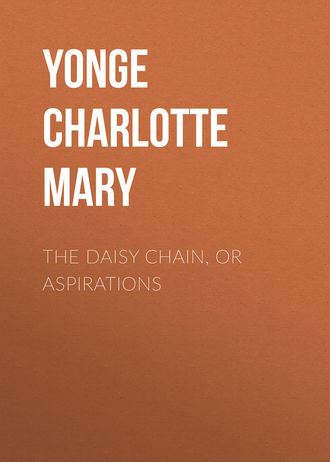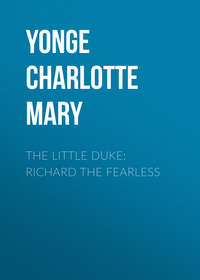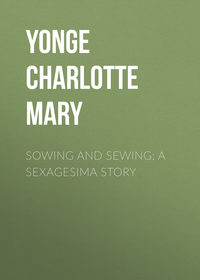
The Daisy Chain, or Aspirations
Hand-in-hand, they silently ascended the stairs, and Ethel pushed open the door. Margaret was on her couch, her whole form and face in one throb of expectation.
She looked into Harry’s face—the eagerness flitted like sunshine on the hillside, before a cloud, and, without a word, she held out her arms.
He threw himself on his knees, and her fingers were clasped among his thick curls, while his frame heaved with suppressed sobs, “Oh, if he could only have come back to you.”
“Thank God,” she said; then slightly pushing him back, she lay holding his hand in one of hers, and resting the other on his shoulder, and gazing in silence into his face. Each was still—she was gathering strength—he dreaded word or look.
“Tell me how and where;” she said at last.
“It was in the Loyalty Isles; it was fever—the exertions for us. His head was lying here,” and he pointed to his own breast. “He sent his love to you—he bade me tell you there would be meeting by and by, in the haven where he would be.—I laid his head in the grave—under the great palm—I said some of the prayers—there are Christians round it.”
He said this in short disconnected phrases, often pausing to gather voice, but forced to resume, by her inquiring looks and pressure of his hand.
She asked no more. “Kiss me,” she said, and when he had done so, “Thank you, go down, please, all of you. You have brought great relief. Thank you. But I can’t talk yet. You shall tell me the rest by and by.”
She sent them all away, even Ethel, who would have lingered.
“Go to him, dearest. Let me be alone. Don’t be uneasy. This is peace—but go.”
Ethel found Mary and Harry interlaced into one moving figure, and Harry greedily asking for his father and Norman, as if famishing for the sight of them. He wanted to set out to seek the former in the town, but his movements were too uncertain, and the girls clung to the newly-found, as if they could not trust him away from them. They wandered about, speaking, all three at random, without power of attending to the answers. It was enough to see him, and touch him; they could not yet care where he had been.
Dr. May was in the midst of them ere they were aware. One look, and he flung his arms round his son, but, suddenly letting him go, he burst away, and banged his study door. Harry would have followed.
“No, don’t,” said Ethel; then, seeing him disappointed, she came nearer, and murmured, “‘He entered into his chamber and—‘”
Harry silenced her with another embrace, but their father was with them again, to verify that he had really seen his boy, and ask, alas! whether Alan were with Margaret. The brief sad answer sent him to see how it was with her. She would not let him stay; she said it was infinite comfort, and joy was coming, but she would rather be still, and not come down till evening.
Perhaps others would fain have been still, could they have borne an instant’s deprivation of the sight of their dear sailor, while greetings came thickly on him. The children burst in, having heard a report in the town, and Dr. Spencer waited at the door for the confirmation; but when Ethel would have flown out to him, he waved his hand, shut the door, and hurried away, as if a word to her would have been an intrusion.
The brothers had been summoned by a headlong apparition of Will Adams in Cocksmoor school, shouting that Master Harry was come home; and Norman’s long legs out-speeding Richard, had brought him back, flushed, and too happy for one word, while, “Well, Harry,” was Richard’s utmost, and his care for Margaret seemed to overpower everything else, as he went up, and was not so soon sent away.
Words were few downstairs. Blanche and Aubrey agreed that they thought people would have been much happier, but, in fact, the joy was oppressive from very newness. Ethel roamed about, she could not sit still without feeling giddy, in the strangeness of the revulsion. Her father sat, as if a word would break the blest illusion; and Harry stood before each of them in turn, as if about to speak, but turned his address into a sudden caress, or blow on the shoulder, and tried to laugh. Little Gertrude, not understanding; the confusion, had taken up her station under the table, and peeped out from beneath the cover.
There was more composure as they sat at dinner, and yet there was very little talking or eating. Afterwards Dr. May and Norman exultingly walked away, to show their Harry to Dr. Spencer and Mr. Wilmot; and Ethel would gladly have tried to calm herself, and recover the balance of her mind, by giving thanks where they were due; but she did not know what to do with her sisters. Blanche was wild, and Mary still in so shaky a state of excitement, that she went off into mad laughing, when Blanche discovered that they were in mourning for Harry.
Nothing would satisfy Blanche but breaking in on Margaret, and climbing to the top of the great wardrobe to disinter the coloured raiment, beseeching that each favourite might be at once put on, to do honour to Harry. Mary chimed in with her, in begging for the wedding merinos—would not Margaret wear her beautiful blue?
“No, my dear, I cannot,” said Margaret gently.
Mary looked at her and was again in a flood of tears, incoherently protesting, together with Ethel, that they would not change.
“No, dears,” said Margaret. “I had rather you did so. You must not be unkind to Harry. He will not think I do not welcome him. I am only too glad that Richard would not let my impatience take away my right to wear this.”
Ethel knew that it was for life.
Mary could not check her tears, and would go on making heroic protests against leaving off her black, sobbing the more at each. Margaret’s gentle caresses seemed to make her worse, and Ethel, afraid that Margaret’s own composure would be overthrown, exclaimed, “How can you be so silly? Come away!” and rather roughly pulled her out of the room, when she collapsed entirely at the top of the stairs, and sat crying helplessly.
“I can’t think what’s the use of Harry’s coming home,” Gertrude was heard saying to Richard. “It is very disagreeable;” whereat Mary relapsed into a giggle, and Ethel felt frantic.
“Richard! Richard! what is to be done with Mary? She can’t help it, I believe, but this is not the way to treat the mercy that—”
“Mary had better go and lie down in her own room,” said Richard, tenderly and gravely.
“Oh, please! please!” began Mary, “I shall not see him when he comes back!”
“If you can’t behave properly when he does come,” said Richard, “there is no use in being there.”
“Remember, Ritchie,” said Ethel, thinking him severe, “she has not been well this long time.”
Mary began to plead, but, with his own pretty persuasive manner, he took her by the hand, and drew her into his room; and when he came down, after an interval, it was to check Blanche, who would have gone up to interrupt her with queries about the perpetual blue merino. He sat down with Blanche on the staircase window-seat, and did not let her go till he had gently talked her out of flighty spirits into the soberness of thankfulness.
Ethel, meanwhile, had still done nothing but stray about, long for loneliness, find herself too unsteady to finish her letters to Flora and Tom; and, while she tried to make Gertrude think Harry a pleasant acquisition, she hated her own wild heart, that could not rejoice, nor give thanks, aright.
By and by Mary came down, with her bonnet on, quite quiet now. “I am going to church with Ritchie,” she said. Ethel caught at the notion, and it spread through the house. Dr May, who just then came in with his two sons, looked at Harry, saying, “What do you think of it? Shall we go, my boy?” And Harry, as soon as he understood, declared that he should like nothing better. It seemed what they all needed, even Aubrey and Gertrude begged to come, and, when the solemn old minster was above their heads, and the hallowed stillness around them, the tightened sense of half-realised joy began to find relief in the chant of glory. The voices of the sanctuary, ever uplifting notes of praise, seemed to gather together and soften their emotions; and agitation was soothed away, and all that was oppressive and tumultuous gave place to sweet peace and thankfulness. Ethel dimly remembered the like sense of relief, when her mother had hushed her wild ecstasy, while sympathising with her joy. Richard could not trust his voice, but Mr. Wilmot offered the special thanksgiving.
Harry was, indeed, “at home,” and his tears fell fast over his book, as he heard his father’s “Amen,” so fervent and so deep; and he gazed up and around, with fond and earnest looks, as thoughts and resolutions, formed there of old, came gathering thick upon him. And there little Gertrude seemed first to accept him. She whispered to her papa, as they stood up to go away, that it was very good in God Almighty to have sent Harry home; and, as they left the cloister, she slipped into Harry’s hand a daisy from the grave, such a gift as she had never carried to any one else, save her father and Margaret, and she shrank no longer from being lifted up in his arms, and carried home through the twilight street.
He hurried into the drawing-room, and was heard declaring that all was right, for Margaret was on the sofa; but he stopped short, grieved at her altered looks. She smiled as he stooped to kiss her, and then made him stand erect, and measure himself against Norman, whose height he had almost reached. The little curly midshipman had come back, as nurse said, “a fine-growed young man,” his rosy cheeks, brown and ruddy, and his countenance—
“You are much more like papa and Norman than I thought you would be,” said Margaret.
“He has left his snub nose and yellow locks behind,” said his father; “though the shaggy mane seems to remain. I believe lions grow darker with age. So there stand June and July together again!”
Dr. May walked backwards to look at them. It was good to see his face.
“I shall see Flora and Tom to-morrow!” said Harry, after nodding with satisfaction, as they all took their wonted places.
“Going!” exclaimed Richard.
“Why, don’t you know?” said Ethel; “it is current in the nursery that he is going to be tried by court-martial for living with the King of the Cannibal Islands.”
“Aubrey says he had a desert island, with Jennings for his man Friday,” said Blanche.
“Harry,” said little Gertrude, who had established herself on his knee, “did you really poke out the giant’s eye with the top of a fir-tree?”
“Who told you so, Daisy?” was the general cry; but she became shy, and would not answer more than by a whisper about Aubrey, who indignantly declared that he never said so, only Gertrude was so foolish that she did not know Harry from Ulysses.
“After all,” said Ethel, “I don’t think our notions are much more defined. Papa and Norman may know more, but we have heard almost nothing. I have been waiting to hear more to close up my letters to Flora and Tom. What a shame that has not been done!”
“I’ll finish,” said Mary, running to the side-table.
“And tell her I’ll be there to-morrow,” said Harry. “I must report myself; and what fun to see Flora a member of Parliament! Come with me, June; I’ll be back next day. I wish you all would come.”
“Yes, I must come with you,” said Norman. “I shall have to go to Oxford on Thursday;” and very reluctant he looked. “Tell Flora I am coming, Mary.”
“How did you know that Flora was a married lady?” asked Blanche, in her would-be grown-up manner.
“I heard that from Aunt Flora. A famous lot of news I picked up there!”
“Aunt Flora!”
“Did you not know he had been at Auckland?” said Dr. May. “Aunt Flora had to nurse him well after all he had undergone. Did you not think her very like mamma, Harry?”
“Mamma never looked half so old!” cried Harry indignantly.
“Flora was five years younger!”
“She has got her voice and way with her,” said Harry; “but you will soon see. She is coming home soon.”
There was a great outcry of delight.
“Yes, there is some money of Uncle Arnott’s that must be looked after, but he does not like the voyage, and can’t leave his office, so perhaps Aunt Flora may come alone. She had a great mind to come with me, but there was no good berth for her in this schooner, and I could not wait for another chance. I can’t think what possessed the letters not to come! She would not write by the first packet, because I was so ill, but we both wrote by the next, and I made sure you had them, or I would have written before I came.”
The words were not out of his mouth before the second post was brought in, and there were two letters from New Zealand! What would they not have been yesterday? Harry would have burned his own, but the long closely-written sheets were eagerly seized, as, affording the best hope of understanding his adventures, as it had been written at intervals from Auckland, and the papers, passing from one to the other, formed the text for interrogations on further details, though much more was gleaned incidentally in tete-a-tetes, by Margaret, Norman, or his father, and no one person ever heard the whole connectedly from Harry himself.
“What was the first you knew of the fire, Harry?” asked Dr. May, looking up from the letter.
“Owen shaking me awake; and I thought it was a hoax,” said Harry. “But it was true enough, and when we got on deck, there were clouds of smoke coming up the main hatch-way.”
Margaret’s eyes were upon him, and her lips formed the question, “And he?”
“He met us, and told us to be steady—but there was little need for that! Every man there was as cool and collected as if it had been no more than the cook’s stove—and we should have scorned to be otherwise! He put his hand on my shoulder and said, ‘Keep by me,’ and I did.”
“Then there was never much hope of extinguishing the fire?”
“No; if you looked down below the forecastle it was like a furnace, and though the pumps were at work, it was only to gain time while the boats were lowered. The first lieutenant told off the men, and they went down the side without one word, only shaking hands with those that were left.”
“Oh, Harry! what were you thinking of?” cried Blanche.
“Of the powder,” said Harry.
Ethel thought there was more in that answer than met the ear, and that Harry, at least, had thought of the powder to-night at church.
“Mr. Ernescliffe had the command of the second cutter. He asked to take me with him; I was glad enough; and Owen—he is mate, you know—went with us.”
As to telling how he felt when he saw the good ship Alcestis blown to fragments, that was past Harry, and all but Blanche were wise enough not to ask. She had by way of answer, “Very glad to be safe out of her.”
Nor was Harry willing to dwell on the subsequent days, when the unclouded sun had been a cruel foe; and the insufficient stores of food and water did, indeed, sustain life, but a life of extreme suffering. What he told was of the kindness that strove to save him, as the youngest, from all that could be spared him. “If I dropped asleep at the bottom of the boat, I was sure to find some one shading me from the sun. If there was an extra drop of water, they wanted me to have it.”
“Tell me their names, Harry!” cried Dr. May. “If ever I meet one of them—”
“But the storm, Harry, the storm?” asked Blanche. “Was that not terrible?”
“Very comfortable at first, Blanche,” was the answer. “Oh, that rain!”
“But when it grew so very bad?”
“We did not reck much what happened to us,” said Harry. “It could not be worse than starving. When we missed the others in the morning, most of us thought them the best off.”
Mary could not help coming round to kiss him, as if eyes alone were not enough to satisfy her that here he was.
Dr. May shuddered, and went on reading, and Margaret drew Harry down to her, and once more by looks craved for more minute tidings.
“All that you can think,” murmured Harry; “the very life and soul of us all—so kind, and yet discipline as perfect as on board. But don’t now, Margaret—”
The tone of the don’t, the reddening cheek, liquid eye, and heaving chest, told enough of what the lieutenant had been to one, at least, of the desolate boat’s crew.
“Oh, Harry, Harry! I can’t bear it!” exclaimed Mary. “How long did it last? How did it end?”
“Fifteen days,” said Harry. “It was time it should end, for all the water we had caught in the storm was gone—we gave the last drop to Jones, for we thought him dying; one’s tongue was like a dry sponge.”
“How did it end?” repeated Mary, in an agony.
“Jennings saw a sail. We thought it all a fancy of weakness, but ‘twas true enough, and they saw our signal of distress!”
The vessel proved to be an American whaler, which had just parted with her cargo to a homeward bound ship, and was going to refit, and take in provisions and water at one of the Milanesian islands, before returning for further captures. The master was a man of the shrewd, hard money-making cast; but, at the price of Mr. Ernescliffe’s chronometer, and of the services of the sailors, he undertook to convey them where they might fall in with packets bound for Australia.
The distressed Alcestes at first thought themselves in paradise, but the vessel, built with no view, save to whales, and, with a considerable reminiscence of the blubber lately parted with, proved no wholesome abode, when overcrowded, and in the tropics! Mr. Ernescliffe’s science, resolution, and constancy, had saved his men so far; but with the need for exertion his powers gave way, and he fell a prey to a return of the fever which had been his introduction to Dr. May.
“There he was,” said Harry, “laid up in a little bit of a stifling cabin, just like an oven, without the possibility of a breath of air! The skin-flint skipper carried no medicine; the water—shocking stuff it was—was getting so low, that there was only a pint a day served out to each, and though all of us Alcestes clubbed every drop we could spare for him—it was bad work! Owen and I never were more glad in our lives than when we heard we were to cast anchor at the Loyalty Isles! Such a place as it was! You little know what it was to see anything green! And there was this isle fringed down close to the sea with cocoa-nut trees! And the bay as clear!—you could see every shell, and wonderful fishes swimming in it! Well, every one was for going ashore, and some of the natives swam out to us, and brought things in their canoes, but not many; it is not encouraged by the mission, nor by David—for those Yankee traders are not the most edifying society—and the crew vowed they were cannibals, and had eaten a man three years ago, so they all went ashore armed.”
“You stayed with him,” said Margaret.
“Ay, it was my turn, and I was glad enough to have some fresh fruit and water for him, but he could not take any notice of it. Did not I want you, papa? Well, by and by, Owen came back, in a perfect rapture with the place and the people, and said it was the only hope for Mr. Ernescliffe, to take him on shore—”
“Then you did really go amongst the cannibals!” exclaimed Blanche.
“That is all nonsense,” said Harry. “Some of them may once have been, and I fancy the heathens might not mind a bit of ‘long pig’ still; but these have been converted by the Samoans.”
The Samoans, it was further explained, are the inhabitants of the Navigator Islands, who, having been converted by the Church Missionary Society, have sent out great numbers of most active and admirable teachers among the scattered islands, braving martyrdom and disease, never shrinking from their work, and, by teaching and example, preparing the way for fuller doctrine than they can yet impart. A station of these devoted men had for some years been settled in this island, and had since been visited by the missions of Newcastle and New Zealand. The young chief, whom Harry called David, and another youth, had spent two summers under instruction at New Zealand, and had been baptised. They were spending the colder part of the year at home, and hoped shortly to be called for by the mission-ship to return, and resume their course of instruction.
Owen had come to an understanding with the chief and the Samoans, and had decided on landing his lieutenant, and it was accordingly done, with very little consciousness on the patient’s part. Black figures, with woolly mop-heads, and sometimes decorated with whitewash of lime, crowded round to assist in the transport of the sick man through the surf; and David himself, in a white European garb, met his guests, with dignified manners that would have suited a prince of any land, and conducted them through the grove of palms, interspersed with white huts, to a beautiful house consisting of a central room, with many others opening from it, floored with white coral lime, and lined with soft shining mats of Samoan manufacture. This, Harry learned, had been erected by them in hopes of an English missionary taking up his abode amongst them.
They were a kindly people, and had shown hospitality to other Englishmen, who had less appreciated it than these young officers could. They lavished every kindness in their power upon them, and Mr. Ernescliffe, at first, revived so much, that he seemed likely to recover.
But the ship had completed her repairs, and was ready to sail. The two midshipmen thought it would be certain death to their lieutenant to bring him back to such an atmosphere; “and so,” continued Harry’s letter to his father, “I thought there was nothing for it but for me to stay with him, and that you would say so. I got Owen to consent, after some trouble, as we were sure to be fetched off one time or another. We said not a word to Mr. Ernescliffe, for he was only sensible now and then, so that Owen had the command. Owen made the skipper leave me a pistol and some powder, but I was ashamed David should know it, and stowed it away. As to the quarter-master, old Jennings, whose boy you remember we picked up at the Roman camp, he had not forgotten that, and when we were shaking hands and wishing good-bye, he leaped up, and vowed ‘he would never leave the young gentleman that had befriended his boy, to be eaten up by them black savage niggers. If they made roast-pork of Mr. May, he would be eaten first, though he reckoned they would find him a tougher morsel.’ I don’t think Owen was sorry he volunteered, and no words can tell what a blessing the good old fellow was to us both.
“So there we stayed, and, at first, Mr. Ernescliffe seemed mending. The delirium went off, he could talk quite clearly and comfortably, and he used to lie listening, when David and I had our odd sort of talks. I believe, if you had been there, or we could have strengthened him any way, he might have got over it; but he never thought he should, and he used to talk to me about all of you, and said Stoneborough had been the most blessed spot in his life; he had never had so much of a home, and that sharing our grief, and knowing you, had done him great good, just when he might have been getting elated. I cannot recollect it all, though I tried hard, for Margaret’s sake, but he said Hector would have a great deal of temptation, and he hoped you would be a father to him, and Norman an elder brother. You would not think how much he talked of Cocksmoor, about a church being built there, as Ethel wished, and little Daisy laying the first stone. I remember one night, I don’t know whether he was quite himself, for he looked full at me with his eyes, that had grown so large, till I did not know what was coming, and he said, ‘I have seen a ship built by a sailor’s vow; the roof was like the timbers of a ship—that was right. Mind, it is so. That is the ship that bears through the waves; there is the anchor that enters within the veil.’ I believe that was what he said. I could not forget that—he looked at me so; but much more he said, that I dimly remember, and chiefly about poor dear Margaret. He bade me tell her—his own precious pearl, as he used to call her—that he was quite content, and believed it was best for her and him both, that all should be thus settled, for they did not part for ever, and he trusted—But I can’t write all that.” (There was a great tear-blot just here). “It is too good to recollect anywhere but at church. I have been there to-day, with my uncle and aunt, and I thought I could have told it when I came home, but I was too tired to write then, and now I don’t seem as if it could be written anyhow. When I come home, I will try to tell Margaret. The most part was about her; only what was better seemed to swallow that up.”









